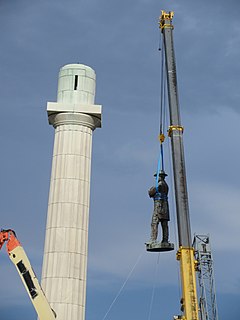
The United Daughters of the Confederacy (UDC) is an American hereditary association of Southern women established in 1894 in Nashville, Tennessee. The stated purposes of the organization includes the commemoration of Confederate soldiers and the funding of the erection of memorials to these men. Many historians have described the organization's treatment of the Confederacy, along with its promotion of the Lost Cause movement, as advocacy for white supremacy.

Vanderbilt University is a private research university in Nashville, Tennessee. Founded in 1873, it was named in honor of New York shipping and rail magnate Cornelius Vanderbilt, who provided the school its initial $1-million endowment despite having never been to the South. Vanderbilt hoped that his gift and the greater work of the university would help to heal the sectional wounds inflicted by the Civil War.

Gertrude Vanderbilt Whitney was an American sculptor, art patron and collector, and founder in 1931 of the Whitney Museum of American Art in New York City. She was a prominent social figure and hostess, who was born into the wealthy Vanderbilt family and married into the Whitney family.

The Lost Cause of the Confederacy, or simply the Lost Cause, is an ideology that holds that the cause of the Confederacy during the American Civil War was a just and heroic one. The ideology endorses the supposed virtues of the antebellum South, viewing the war as a struggle primarily for the Southern way of life or "states' rights" in the face of overwhelming "Northern aggression". At the same time, the Lost Cause minimizes or denies outright the central role of slavery in the outbreak of the war.

Mount Olivet Cemetery is a 206-acre (83 ha) cemetery located in Nashville, Tennessee. It is located approximately two miles East of Downtown Nashville, and adjacent to the Catholic Calvary Cemetery. It is open to the public during daylight hours.
A memorial hall is a hall built as a memorial, typically to those who have lost their lives in war. Specifically, Memorial Hall may refer to:
The University of Nashville was an educational institution that existed as a distinct entity from 1826 until 1909. During its history, it operated at various times a medical school, a four-year military college, a literary arts college, and a boys preparatory school. Educational institutions in operation today that can trace their roots to the University of Nashville include Montgomery Bell Academy, an all-male preparatory school; the Vanderbilt University Medical School; Peabody College at Vanderbilt University; and the University School of Nashville, a co-educational preparatory school.

The Confederate Monument in Lawrenceburg, Kentucky is an 8-foot-tall (2.4 m) figure which was built in 1894 by the Kentucky Women's Monumental Association, a predecessor of the United Daughters of the Confederacy, an organization founded in that year. Its governing body is the government of Lawrenceburg.

Confederate Memorial Park is an Alabama State Park located in Mountain Creek, in rural Chilton County, Alabama. Its address is 437 County Road 63, Marbury, Alabama 36051. It is sometimes found with the same address in Verbena, Alabama 36091.
Henry C. Hibbs (1882–1949) was an American architect. He designed many buildings on the campus of Vanderbilt University in Nashville, Tennessee as well as Davidson College in Davidson, North Carolina. He also designed the libraries of Fisk University in Nashville and the University of Tulsa in Tulsa, Oklahoma. He was the recipient of several awards for his architectural work.

Frank Armstrong Crawford Vanderbilt was an American socialite and philanthropist. During the American Civil War, she was a strong supporter of the Confederate States of America. After the war, she lived in New York City and married multi-millionaire Cornelius Vanderbilt, who donated $1 million to establish Vanderbilt University in Nashville, Tennessee.

For Confederate Memorial Hall, see Memorial Hall, Vanderbilt University.

For decades in the U.S., there have been isolated incidents of removal of Confederate monuments and memorials, although generally opposed in public opinion polls, and several U.S. states have passed laws over 115 years to hinder or prohibit further removals.
Confederate memorial may refer to
Edith D. Pope (1869-1947) was an American editor. She was the second editor of the Confederate Veteran from 1914 to 1932, and the president of the Nashville No. 1 chapter of the United Daughters of the Confederacy from 1927 to 1930. She played a critical role in the promotion of the Lost Cause of the Confederacy.
This page is based on this
Wikipedia article Text is available under the
CC BY-SA 4.0 license; additional terms may apply.
Images, videos and audio are available under their respective licenses.












